| Srl | Item |
| 1 |
ID:
138997
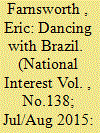

|
|
|
|
|
| Summary/Abstract |
BRAZIL IS on the move. Its economic strength over the past decade has provided the primary means for it to develop long-standing ambitions for a larger global-leadership stake—a path that U.S. policy makers have encouraged for many years, presuming that a stronger, democratic Brazil more actively engaged globally would be a natural ally for the United States. In so doing, however, it has pursued a foreign policy independent of Washington, leading at times to misunderstandings and dashed hopes. This was in evidence even before the revelations of National Security Agency contractor Edward Snowden in 2013 temporarily froze bilateral relations.
|
|
|
|
|
|
|
|
|
|
|
|
|
|
|
|
| 2 |
ID:
098318
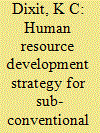

|
|
|
|
|
| Publication |
2010.
|
| Summary/Abstract |
Army personnel trained and equipped for conventional warfare find
themselves at a disadvantage when deployed for sub-conventional operations.
The advancement in technology, changing warfare concepts, induction of
sophisticated weapons and support equipments and need to handle far too
many variables demand deliberate efforts in ensuring recruitment of desired
human resource and their training in the army to suit the requirements of
conventional as well as sub-conventional warfare. This is essential since
possibility of conventional war can not be totally ruled out and at the same
time relevance of sub-conventional operations in today's scenario can no longer
be ignored. This paper is an attempt to evolve a suitable human resource
development strategy for capacity building in Army for coping stress in subconventional
warfare.
|
|
|
|
|
|
|
|
|
|
|
|
|
|
|
|
| 3 |
ID:
089225
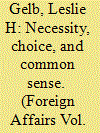

|
|
|
|
|
| Publication |
2009.
|
| Summary/Abstract |
The United States is declining as a nation and a world power, with mostly sighs and shrugs to mark this seismic event. Astonishingly, some people do not appear to realize that the situation is all that serious. A few say it is serious and hopeless. I count myself among those who think it is most serious yet reversible, if Americans are clear-eyed about the causes and courageous about implementing the cures.
|
|
|
|
|
|
|
|
|
|
|
|
|
|
|
|
| 4 |
ID:
143833


|
|
|
|
|
| Publication |
New Delhi, Pentagon Press, 2016.
|
| Description |
xxiii, 520p.hbk
|
| Standard Number |
9788182748712
|
|
|
|
|
|
|
|
|
|
|
|
Copies: C:1/I:0,R:0,Q:0
Circulation
| Accession# | Call# | Current Location | Status | Policy | Location |
| 058476 | 327.51/BHU 058476 | Main | On Shelf | General | |
|
|
|
|
| 5 |
ID:
031386
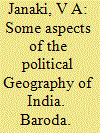

|
|
|
|
|
| Publication |
Baroda, Maharaja Sayajirao University of Baroda Press, 1977.
|
| Description |
265p.Hbk
|
| Series |
Maharaja Sayajirao University of Baroda Geography Series No.8
|
|
|
|
|
|
|
|
|
|
|
|
Copies: C:1/I:0,R:0,Q:0
Circulation
| Accession# | Call# | Current Location | Status | Policy | Location |
| 028400 | 910.132054/JAN 028400 | Main | On Shelf | General | |
|
|
|
|
| 6 |
ID:
134023
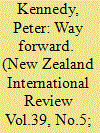

|
|
|
|
|
| Publication |
2014.
|
| Summary/Abstract |
Neither the European Union nor Asia has the concerted impact upon global governance that might be expected of them, given their economic and political strength. The European Union tends to focus more on its immediate neighbourhood, whilst the leading economies in Asia, such as Japan, have favoured the role of 'status quo' powers. The biennial Asia Europe Meeting (ASEM), the first of which was held in 1996, ought to provide a context in which the pragmatism of Asia could mix with a more globally focused Europe to produce shared leadership of benefit to both.
|
|
|
|
|
|
|
|
|
|
|
|
|
|
|
|